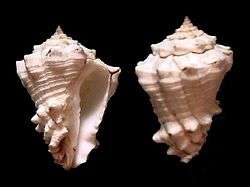Vasum muricatum
Vasum muricatum, common name the Caribbean vase, is a species of medium to large sea snail, a marine gastropod mollusk in the family Turbinellidae.[1]
| Vasum muricatum | |
|---|---|
 | |
| Two views of a shell of Vasum muricatum without periostracum from Los Roques archipelago, Venezuela | |
| Scientific classification | |
| Kingdom: | |
| Phylum: | |
| Class: | |
| (unranked): | |
| Superfamily: | |
| Family: | |
| Genus: | |
| Species: | V. muricatum |
| Binomial name | |
| Vasum muricatum (Born, 1778) | |
| Synonyms | |
|
Turbinella pugillaris Lamarck, 1822 | |
Description
Vasum muricatum has a large, thick and heavy shell that reaches a length of 50 – 100 mm. The shell is quite elongated, conical or vase-shaped (hence the common name). There are blunt spines at the shoulder and near the base. The shell is off- white with black or dark brown periostracum externally, while the aperture is usually white. The columella has 5 strong folds, the first and third being the largest.[2]
Distribution
This species is widespread in the Caribbean Sea. In Venezuela this species has been reported from the state of Falcon,[3] Nueva Esparta[4][5][6] and Dependencias Federales.[7]
Habitat
This species i rather common and is often found in pairs in shallow water. It preys on worms and clams.[8]
Gallery
_000.jpg) Vasum muricatum from Los Monjes Archipelago, Venezuela.
Vasum muricatum from Los Monjes Archipelago, Venezuela._001.jpg) Vasum muricatum from Los Monjes Archipelago, Venezuela.
Vasum muricatum from Los Monjes Archipelago, Venezuela.- Vasum muricatum from Isla La Tortuga
- Vasum muricatum from Isla La Tortuga
References
- Morris, A. P. (1973): “A Field Guide to Shells of the Atlantic and Gulf Coasts and the West Indies”. Hougmon Mifflin Co Boston.
- Abbott, R Tucker (1974). American Seashells. D. Van Nostrand Reinhold. Ltd. New York. 663.
- Bitter, Ricardo S. y Martínez E. Rafael. 2001: Inventario de los moluscos marinos en las costas del estado Falcón, Venezuela. Acta Biologica Venezuelica, 21(1):21-41.
- Macsotay, O. 1982: Intervalos batimetabólicos y batimétricos de algunos moluscos bentónicos marinos de Venezuela. BOL. Soc. Ven. Cien. Nat. 37:103-147
- Princz, D. 1973: Moluscos gastrópodos y pelecipodos del Estado Nueva Esparta, Venezuela. Mem. Soc. Cien. Nat. La Salle, 33:169-222
- Princz, D y a González de Pacheco. 1981: Los moluscos marinos del Parque Nacional La Restinga, isla de Margarita, Venezuela. Ministerio del ambiente y de los Recursos Naturales Renovables. Serie informes cientifico. Zona 14/IC/1-42
- Capelo, J.C. y J. Buitrago. 1998: Distribución d e los moluscos marinos en el oriente de de Venezuela. Mem. Soc. Cien. Nat. La Salle, 150:109-160.
- Warmke, Germaine L. & Abbott, R Tucker. (1961): Caribbean Seashells. Livingston Publishing Company. Narbeth. Pennsylvania.
External links
| Wikimedia Commons has media related to Vasum muricatum. |